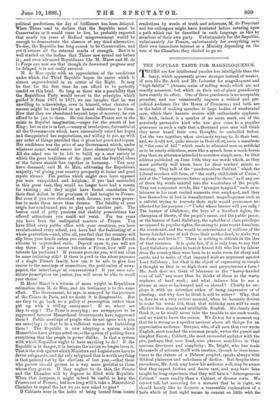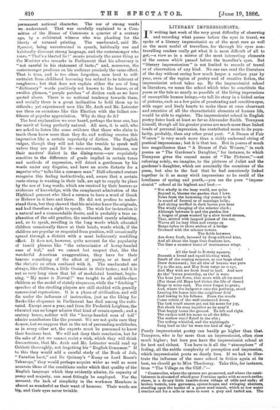THE POPULAR TASTE FOR MAGNILOQUENCE.
THERE are few intellectual puzzles less intelligible than the fancy, which apparently grows stronger instead of weaker, of men like Mr. Arch and Mr. Leicester for magniloquent and "high-falutin' " phrases, series of rolling words which are not exactly nonsense, but which in their out-of-place grandiosity have exactly its effect. One of these gentlemen is an acceptable preacher, and can occasionally impress a critical and pre- judiced audience like the House of Commons ; and both are in the habit of making speeches to large bodies of uneducated men, which their hearers receive with enthusiastic applause. Mr. Arch, indeed, is a speaker of no mean mark, one of the genuinely persuasive kind who can give voice to a popular grievance in such a style that a thousand poor men will think they never heard their own thoughts so embodied before. Yet the two together, when obviously trying to do their best, and, we doubt not, quite sincere in their effort, issue a manifesto to " the sons of toil " which reads to educated men so artificial as to be nearly ridiculous, more like a speech from a mock-heroic play than an utterance intended to convince simple men. In their address published on June 14th, they use words which, as they must perfectly well know, have for their readers' minds no meaning. They talk of the "pandemonium Cabinet" which the Liberal seceders will form, of " the crafty shibboleth of Union," and of the heterogeneous forces opposed to them," as if any one of those big words entered into the vocabulary of the people. They use compound words, like " trumpet-tongued," such as no labourer in his most excited moments ever employed, and they lose themselves at last in manufactured magniloquence such as a satirist trying to travesty their style would pronounce too affected for his purpose :—" Under whose banner will you rally ? The banner of Gladstone, the hero of a hundred fights, the champion of liberty, of the people's cause, and the public peace ; or the banner of Lord Salisbury, the upholder of class privileges as opposed to popular rights, the enemy to your recent franchise, the coercionist, and the would-be exterminator of millions of the horny-handed sons of toil from their mother-land, to make way for flocks and herds ?" There is nothing to ridicule in the idea of that sentence. It is quite fair, if it is only true, to say that Lord Salisbury wishes to banish honest folk who live by labour from the country they were born in to make room for sheep and cattle, and to make of that imputed wish an argument against Lord Salisbury ; but what is the object of expressing so simple a thought as that in so high-flown and preposterous a form ? Mr. Arch does not think of labourers as the " horny-handed sons of toil," any more than he thinks of them as the warty nephews of hard work ; and what induces him to use a phrase at once so hackneyed and so absurd ? Clearly he em- ploys it with an intention either of being impressive or of pleasing; and why does he think it will be either P Why, that is, does he at a very serious moment, when he honestly desires to make his words felt, think that rubbishy rant will be more effective than simple and intelligible English. He clearly does think it, or he would never take the trouble to use each words, and we want to know the reason. We do not for a moment say that he is wrong as a speaker anxious above all things for an appreciative audience. Bunyan, who, of all men that ever wrote English, most touched the common people, writes the purest and simplest Saxon ; Cobbett, the most successful agitator with the pen, perhaps, that ever lived, uses phrases matchless in their nervous directness and simplicity ; Mr. Bright, who has made thousands of artisans thrill with emotion, though he rises some- times to the stature of a Hebrew prophet, speaks always with Biblical plainness and nakedness of diction. But despite these precedents, Mr. Arch may know his audience well, may be aware that they expect fustian and desire rant, and may have been taught by long experience that they will hate a " heterogeneous Cabinet " more readily than a Cabinet of diverse sorts. We cannot tell, but assuming for a moment that he is right, we should keenly like to discover a reasonable explanation of a taste which at first sight seems to consist so little with the permanent national character. The use of strong words we . understand. That was carefully explained to a Com-
mittee of the House of Commons a quarter of a century ago, by a cultivated witness who was pleading for the liberty of untaxed printing. The uneducated, said Mr.
Spencer, being unrestrained in speech, habitually use and habitually discount strong language, and the costermonger who roars, " That's a blasted lie !" means precisely the same thing as the Minister who remarks in Parliament that his adversary is " not careful is his statement of facts ;" and, moreover, the costermonger produces on his audience precisely the same effect.
That is true, and is too often forgotten, men bred to self- restraint from childhood becoming too refined to be tolerant of roughness ; but that does not explain either the use of long
" dictionary " words positively not known to the hearer, or of swollen phrases, " purple patches " of diction such as we have quoted above. There is no national tendency towards them, and socially there is a great inclination to hold them up to ridicule ; yet experienced men like Mr. Arch and Mr. Leicester use them on occasions like this Election with the fullest con- fidence of popular appreciation. Why do they do it P The best explanation we ever heard, perhaps the true one, has the merit of being perfectly natural. All men, it is said, who are asked to listen like some evidence that those who claim to teach them know more than they do, and nothing creates this impression like a certain superiority of diction. The English vulgar, though they will not take the trouble to speak well unless they are paid for it—men-servants, for instance, use their masters' dialect in the dining-room—are exquisitely sensitive to the difference of grade implied in certain tones and methods of expression, will detect a gentleman by his words under any disguise, and have an acute distaste for a superior who " talks like a common man." Half-educated orators recognise this feeling instinctively, and, aware that a certain caste-stamp is wanting in their talk, are apt to supply its place by the use of long words, which are received by their hearers as evidences of knowledge, with the complacent admiration of the Highland peasant who liked a sermon to have a word of Greek or Hebrew in it here and there. He did not profess to under- stand them, but they showed that his minister knew the originals, and had therefore a right to speak. The wish for instruction is a natural and a commendable desire, and is probably a true ex- planation of the odd practice, the uneducated openly admiring, and, so to speak, revelling in the long words which educated children occasionally throw at their heads, words which, if the children are popular or respected from position, will occasionally spread through a district with a most ludicrously muddling effect. It does not, however, quite account for the popularity of tumid phrases like "the exterminator of horny-handed sons of toil," and we cannot but suspect that, like the wonderful American exaggerations, they have for their hearers something of the effect of poetry, or at least of the rhetoric so often confused with it. The uneducated are always, like children, a little Ossianic in their tastes ; and it is not so very long since that bit of modulated bombast, begin- ning, " My name is Norval !" was taught to all middle-class children as the model of stately eloquence, while the " fetching" speeches of the strolling players are still studded with grandly nonsensical expressions. It is a phase of civilisation, and will die under the influence of instruction, jest as the liking for Burke-like eloquence in Parliament has died among the culti- vated. Except once a year, and from Sir Frederick Leighton, the educated can no longer admire that kind of ornate speech; and a century hence, neither will the " horny-handed sons of toil" admire manifestoes like the present. We are not quite sure they do now, but we suppose that in the art of persuading multitudes, as in every other art, the experts must be presumed to know their business best. We will not deny their conclusion, but for the sake of Art we cannot resist a wish, which they will think discourteous, that Mr. Arch and Mr. Leicester would read up Cobbett thoroughly, not forgetting his " English Grammar." If to this they would add a careful study of the Book of Job, "Paradise Lost," and De Qnincey's "Essay on Lord Rosse's Telescope," they would perhaps acquire wider as well as more accurate ideas of the conditions under which that quality of the English language which they evidently admire, its capacity of pomp and majesty, can most fittingly be employed. For the moment. the lack of simplicity in the workmen Members is almost as wonderful as their want of humour. Their words are big, and their eyes never twinkle.





































 Previous page
Previous page